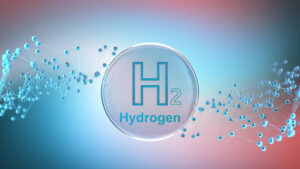Titan’s fuel cell tech could be a hydrogen game-changer

Pic: Yuichiro Chino / Moment via Getty Images
Titan Hydrogen is working on commercialising the first mobility fuel cell in Australia capable of generating more electrical energy from the same amount of hydrogen while also reducing emissions.
While incremental industry approaches could yield a 5-10 per cent improvement, Titan Hydrogen‘s radically disruptive approach to fuel cell development has the potential for a much bigger increase in fuel cell efficiency.
Currently, Polymer Electrolyte Membrane (PEM) fuel cells typically convert less than 40 per cent of the energy of the supplied hydrogen into electricity. But Titan says its tech could deliver a +60 per cent increase in fuel efficiency.
PEM fuel cells need large quantities of hydrogen to achieve a reasonable range, reducing the cost effectiveness of fuel cell powered vehicles.
This means that the efficiency of using hydrogen to store electricity can be as low as 50 per cent compared to batteries, which have over 90 per cent efficiency.
Titan’s fuel cell tech, however, is designed to effectively double the driving range of a vehicle.
It will enable a fuel cell to produce more electricity from the same amount of hydrogen, reducing the cost per kilometre and making hydrogen cheaper than any other fuel source.
This disruptive tech could be what brings hydrogen into the mainstream.
The Hydrogen Council – a global CEO-led initiative of 92 leading energy, transport, industry and investment companies – estimates that hydrogen could be as cost competitive as conventional transport options by 2030.
For heavy-duty trucks and long-range segments in particular, fuel cell electric vehicles (FCEVs) are emerging as a complementary solution to battery electric vehicles (BEVs).
The Hydrogen Council believes FCEVs can achieve breakeven with diesel for heavy-duty long-haul transport by 2028 if hydrogen can be made available for $US4.50 per kilogram (including hydrogen production, distribution and refuelling station costs) at the pump.
By 2030, it is expected there will be around 4.5 million FCEVs on the road, with China, Japan and Korea leading the charge.
Titan, which has patents pending and will submit additional patents shortly, will begin a proof of concept program in the third quarter of this year with testing slated for completion by the end of the year.
This article was developed in collaboration with Titan Hydrogen, a Stockhead advertiser at the time of publishing.
This article does not constitute financial product advice. You should consider obtaining independent advice before making any financial decisions.
Related Topics

UNLOCK INSIGHTS
Discover the untold stories of emerging ASX stocks.
Daily news and expert analysis, it's free to subscribe.
By proceeding, you confirm you understand that we handle personal information in accordance with our Privacy Policy.








